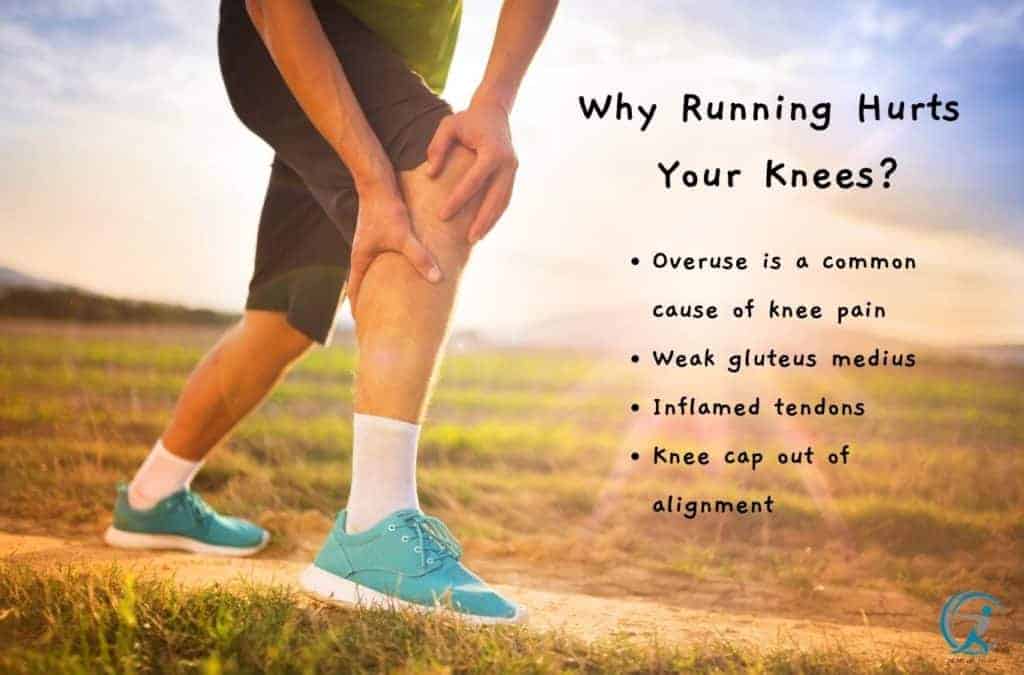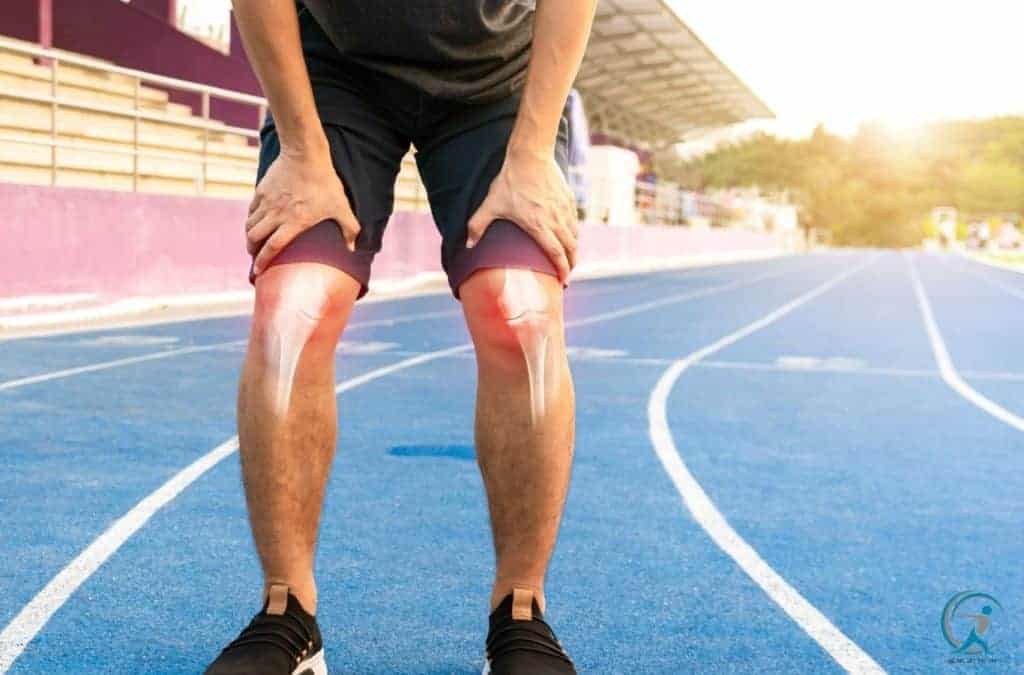Running can cause knee pain. But there are some things you can do to prevent running hurts knees. Read this article to learn more.

Runner’s knee—it’s a real problem. Estimates are that it occurs in 40% of runners and 15% of the population at large. But if you’re experiencing knee pain whenever you run, whether it’s behind the kneecap, your knee swelling up or locking, or an overall discomfort that makes it hard to keep going, don’t despair. There’s hope! Just like there are things you can do to prevent runner’s knee, there are also ways to treat and heal from it. In this article we’ll explain how runner’s knee happens and what you can do about it. Let’s get started!
Runner’s knee is a common problem, especially among distance runners and other people who run a lot.
Runner’s knee is a common problem, especially among distance runners and other people who run a lot.
Common symptoms of runner’s knee include pain around the kneecap and difficulty bending your knee. The pain may get worse when you run or walk downhill, kneel down (like for gardening), squat, climb stairs, or do activities that require kneeling on one knee like yoga poses or weightlifting.
It can take about six weeks to heal from runner’s knee without treatment. If you have a severe case of runner’s knee that lasts longer than 6 weeks without getting better with home treatments such as ice packs, ibuprofen (Advil) or rest then see your doctor because they might recommend physical therapy exercises or other treatments like injections into the joint capsule where most of the pain resides at so it doesn’t continue hurting as much throughout each day!
Why does running hurt your knees?




There can be a number of reasons why running hurts your knees, including overuse, weakened thigh muscles, tightness in the lower back or the hip flexors, or weak glute muscles.
There can be a number of reasons why running hurts your knees, including overuse, weakened thigh muscles, tightness in the lower back or the hip flexors, or weak glute muscles.
Overuse is a common cause of knee pain.
Overdoing it with too much mileage or speedwork can cause inflammation and irritation to your patellofemoral joint — the part of your knee where your thigh bone meets your kneecap. This inflammation can lead to patellofemoral pain syndrome (PFPS), which is often characterized by a dull ache in and around your kneecap when you run.
Weak gluteus medius
The gluteus medius muscle helps stabilize the leg during movement and protects against injury. If this muscle isn’t working properly, it causes stress on other nearby structures like the IT band and knee cap because there isn’t enough support for these areas when running on uneven surfaces such as trails or dirt roads.
Inflamed tendons
The tendon connects muscle to bone and carries force from one area across joints during exercise; any irritation here can cause discomfort while jogging.
Knee cap out of alignment
When one side of our bodies looks different than another side due to injury or trauma after impact (like falling off balance), this could affect how we move throughout each day including while exercising at high speeds over long distances such as during races like marathons.”
Your kneecap could be out of alignment
If you have pain at the front of your knee, your kneecap could be out of alignment. Or if you have pain behind your knee, it could be due to the tendons that support your kneecap becoming inflamed. Pain in this area can also be caused by swelling and overuse.
How do you know if your pain is caused by runner’s knee?
See if it gets better when you’re not running and worse when you are. Also, look for swelling.
When you’re trying to figure out what’s causing your runner’s knee, it’s important to look for swelling. If the affected area is swollen, it might be a sign of inflammation. Inflammation can also cause pain and make things worse when you run.
You should also look for pain when running, especially during any activity that involves repetitive knee bending (such as lunges). You should also pay attention to how much pain there is when walking around normally—does the pain get worse in certain situations? If so, those could be signs of runner’s knee as well. Finally, if there’s a lot of discomfort while resting or at rest, then that could be another sign that you might have this condition.
Prevent knee pain from running




If you want to prevent knee pain from running, make sure to warm up before every run and build up mileage slowly over time. Try strengthening exercises as well as stretching exercises. And consider using compression sleeves or taping for support.
- You should always warm up before running, and you should never start out of the gate running at 100 percent of your ability.
- Build up your mileage slowly over time, and take plenty of rest days between runs to allow your body to recover and repair any damage caused by exercise.
- When you’re not running, work on strengthening the muscles that support your knees and legs with exercises like squats, lunges, and leg raises—and don’t forget about stretching!
- In addition to strengthening exercises and stretching exercises, try using compression sleeves or taping for support during activity as well as ice packs after it’s over (don’t forget that icing helps reduce inflammation).
Running injuries are frustrating but fixable
Running injuries are common, but they can be fixed. It may take time and patience—and you’ll have to adjust your running style—but the payoff will be worth it!
Not only that but there are also ways to prevent runner’s knee altogether in the first place.
Conclusion
If you’re getting knee pain when you run, there are a lot of things that could be causing it. But thankfully, most of these problems have simple solutions: rest, ice and anti-inflammatories for the knee joint, strengthening exercises for your muscles and stretching to improve flexibility. As long as you don’t push yourself too hard and keep up with these techniques after you heal, the pain should go away completely.
FAQ about running hurts knees
If you are experiencing pain while running, then it is best to stop until the pain subsides. However, if you are experiencing pain when walking, then you should continue running.
Running makes your knees hurt because it causes your muscles to work harder than they are used to working. This can cause soreness and inflammation.
Running makes your knees hurt because it causes your muscles to tighten up and pull against each other.
Yes, running can help strengthen your knees. However, it’s important to start slowly and gradually increase your mileage.
Runner’s knee is a common injury for runners. The cause of this condition is usually overuse and poor training. However, it can also be caused by an underlying medical condition such as arthritis.
Yes, it can be treated with rest, ice, compression, elevation, and anti-inflammatory medications such as ibuprofen.
How to Improve Runner’s Knee
Alex is a fitness aficionado, empowers others towards healthier, active lives through small, sustainable changes for lasting results. Visit Gearuptofit.com for insightful tips and resources to enrich a balanced lifestyle.









